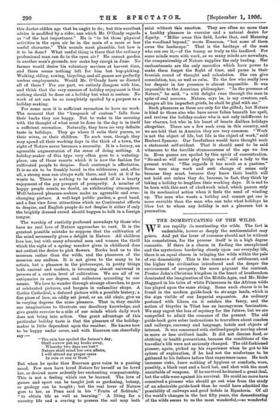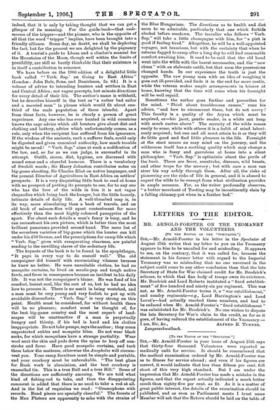THE DOMESTI CATING OF THE WILDS.
WE are rapidly do mesticating the wilds. The fact is undeniable, howev er deeply the sentimentalist may grieve. And yet the lover of romance should not be without his consolations, for the process itself is in a high degree romantic. If there is a charm in finding the unexplained and the mysterious bordering closely upon our everyday life, there is an equal charm in bringing the wilds within the pale of our domesticity. This is the romance of settlement, and the higher the civilisation introduced and the deeper the environment of savagery, the more piquant the contrast. Prester John's Christian kingdom in the heart of heathendom dominated the imagination of the Middle Ages, and Mr. Rider Haggard in his tales of white Princesses in the African wilds has played upon the same string. Some such charm is to be found in the modern guide-book to strange lands, which is the sign visible of our Imperial expansion. An ordinary postcard with Lhasa on it catches the fancy, and the notion of bicycles in Tibet has an incongruous fascination. We may regret the loss of mystery for the future, but we are compelled to admit the romance of the present. The old guide-book gave sober instructions to travellers about coaches and railways, currency and language, hotels and objects of interest. It was concerned with civilised people moving about in more or less civilised lands. It did not discuss food, or clothing, or health precautions, because the conditions of the traveller's life were not seriously changed. The old-fashioned pioneer, again, picked up his experience when he got to his sphere of exploration, if he had not the misfortune to be gathered to his fathers before that experience came. He took immense risks, knew nothing of hygiene or comforts, wore, possibly, a black coat and a hard hat, and shot with the most unsuitable of weapons. If he survived he learned a great deal, but the odds were against his survival. He could no more have conceived a pioneer who should go out wise from the study of an admirable guide-book than he could have admitted the possibility of railways and good hotels in Equatoria. Of all the world's changes in the last fifty years, the domesticating of the wilds seems to us the most wonderful,—so wonderful indeed, that it is only by taking thought that we can get a glimpse of its meaning. For the guide-book—that rode- mecum, of the tripper—and the pioneer, who is the opposite of all that the word "tripper" implies, have been brought into a friendly alliance. Some day, no doubt, we shall be deploring the fact, but for the present we are delighted by the piquancy of it. A tourist's guide to Lhasa and a climber's manual for the Mountains of the Moon, though well within the limits of possibility, are still so barely thinkable that their existence is in itself a contribution to romance.
We have before us the 1906 edition of a delightful little book called "Verb. Sap.' on Going to East Africa" (London : John Bale, Sons, and Danielsson, 2s. 6d.) It is a volume of advice to intending hunters and settlers in East and Central Africa ; not vague precepts, but minute directions for every detail of their life. The author's name is withheld, but he describes himself in the text as "a rather bad sailor and a married man" (a phrase which would fit about one- third of the male population of these islands). Apart from these facts, however, he is clearly a person of great experience. Any one who has ever hunted in wild countries knows the sage advice which old hunters give about diet and clothing and battery, advice which unfortunately comes, as a rule, only when the recipient has suffered from his ignorance. If the wisdom of the ancients, such a sufferer feels, could only be digested and given canonical authority, how much trouble might be saved! "Verb. Sap." aims at such a codification of the law, and, so far as we can judge, is successful in its attempt. Outfit, stores, diet, hygiene, are discussed with sound sense and a cheerful humour. There is a vocabulary of Swahili words ; Sir Harry Johnston contributes notes on big-game shooting, Sir Charles Eliot on native languages, and the present Director of Agriculture in East Africa on settlers' prospects.. It is a very disquieting little book to read at home with no prospect of putting its precepts to use, for to any one who has the love of the wilds in him it is not vague rhapsodies which bring back the hunger, but the little homely, intimate details of daily life. A well-thumbed map is, in its way, more stimulating than a book of travels, and an old book of salmon-flies will upset contentment far more effectively than the most highly coloured panegyrics of the sport. For about such details a man's fancy is busy, and he can reconstruct his own picture, which is better than the most brilliant panorama provided second-hand. The mere list of the seventeen varieties of big-game which the hunter can kill under his 250 license, and the prescriptions for camp life which "Verb. Sap." gives with exasperating clearness, are painful reading to the unwilling slaves of the sedentary life.
-The keynote of the book is to be found in the apophthegm, "It pays in every way to do oneself well." The old campaigner did himself with excruciating vileness because he knew no better. He wore unsuitable clothes, he had no mosquito curtains, he lived on mealie-pap and tough native fowls, and fever in consequence became an incident in his daily life. It was not the campaigner's blame. He was fond of his comfort, honest soul, like the rest of 1113, but he had no idea how to procure it. There is no merit in being wretched, and a -man must be very young and very foolish to put up with avoidable discomforts. "Verb. Sap." is very strong on this peint. Health must be considered, for without health there will be no pleasure; comfort must be thought of, for the best big-game country and the most superb of land- scapes will be unattractive if a man is perpetually hungry and thirsty, if his bed is hard and his clothes inappropriate. Do not take pumps, says the author; they mean unprotected ankles and mosquito bites. Do not wear black socks, for which mosquitoes have a strange partiality. Wear wool next-the skin and pads down the spine to keep off sun- stroke and fever. Have good mosquito curtains, and tuck them below the mattress, otherwise the Anopheles will circum- vent you. Your camp furniture must be simple and portable, and your crockery must -be unbreakable. "The best glass for Bush work is aluminium, and the best crockery is enamelled tin. This is a true Bull and a true Bill." Some of the directions are sufficiently amusing. We are told what kind of fishing-rod to take, and then the disappointing comment is added that there is no need to take a rod at all. And in the list of requisites we read : "Gramophone with records. Band pieces are specially cheerful." The forests of the Mau Plateau are apparently to echo with the strains of the Blue Hungarians. The directions- as to health and dieb seen' to us admirable, particularly that one which forbids alcohol before sundown. The traveller who follows "Verb. Sap." will take a little champagne with him, for "a pint ifs good if feeling tired." Altogether, he will be a well-appointed voyager, not luxurious, but with the certainty that when he returns fagged to camp after a long day he will find reasonable comfort awaiting him. It used to be said that the old hand went into the wilds with the barest necessaries, and the "new chum" with an elaborate outfit, but that soon the possessions changed hands. In our experience the truth is just the opposite. The raw young man with an idea of roughing it goes out ill-provided, and finds it in the end far more costly, while the veteran makes ample arrangements in leisure at home, knowing that the time will come when his foresight will be well repaid.
Sometimes the author goes further and prescribes for the mind. " Think about troublesome causes," runs his advice, "and how to circumvent them, but do not worry ! This faculty is a quality of the Aryan which must be aequired, or—ho jacet, gentle reader, in a white ant heap with much cactus above." The serenity of the wilds comes easily to some, while with others it is a habit of mind labori- ously acquired; but one and all must attain to it or they will do little good and find little pleasure in the life. Foresight at the start means an easy mind on the journey, and the wilderness itself has a soothing quality which may change a man who is fussy and garrulous at home into a silent philosopher. "Verb. Sap." is optimistic about the perils of the bush. There are fever, sunstroke, diseases, wild beasts, and other traps for the unwary ; but with care a man can steer his way safely through them. After all, the risks of pioneering are the risks of life in general, and it is absurd to expect the wilds to be exempt from what civilisation provides in ample measure. For, as the writer profoundly observes,. "a butter merchant of Tooting may be incontinently slain by a falling chimney-pot when in a feather bed."



































 Previous page
Previous page